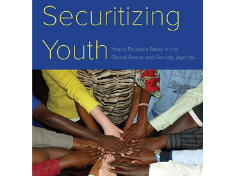-
A Conversation with Marisa O. Ensor on Securitizing Youth and Youth’s Role in Peace and Security Agendas
March 12, 2021 By Amanda King “I’ve been quite impressed by the wide diversity and complexity of young women’s and men’s engagement for peacebuilding and development often while confronting seemingly insurmountable challenges,” says Marisa O. Ensor, Adjunct Professor in the Justice and Peace Studies Program at Georgetown University, in this week’s Friday Podcast.
“I’ve been quite impressed by the wide diversity and complexity of young women’s and men’s engagement for peacebuilding and development often while confronting seemingly insurmountable challenges,” says Marisa O. Ensor, Adjunct Professor in the Justice and Peace Studies Program at Georgetown University, in this week’s Friday Podcast.“I’ve been quite impressed by the wide diversity and complexity of young women’s and men’s engagement for peacebuilding and development often while confronting seemingly insurmountable challenges,” says Marisa O. Ensor, Adjunct Professor in the Justice and Peace Studies Program at Georgetown University, in this week’s Friday Podcast.
In her new edited volume, “Securitizing Youth: Young People’s Roles in the Global Peace and Security Agenda,” contributors cover a wide set of topics that impact youth, peace, and security, including violence, gender dynamics, social media, climate change, and forced displacement. Young people’s position in society is shaped by a number of variables, like age, gender, ethnicity, and religion, says Ensor. This means that the experiences of young women are very different from those of their male counterparts. Yet, often the term “youth” tends to be equated with males. “The category of female youth is not even recognized in some parts of the world,” says Ensor. At the same time, she says, the term “gender” continues to be equated with women. “This remains highly problematic.”
The number of youth today is larger than it has been at any other time in human history, but it is not evenly distributed across the globe. 600 million young people live in conflict-affected regions, and youth make up a majority of the population in the world’s least developed countries. If one hopes to understand the situation on the ground in these countries, one absolutely needs to pay attention to the experiences of youth, says Ensor. It’s also important to avoid essentializing youth, she says, because they don’t constitute a monolithic or homogenous category any more than their older counterparts.
“Pathways to peace can take many different forms in different parts of the world,” says Ensor. She’d like to see more investments and partnerships when it comes to young people’s inclusion in broader security and peacebuilding initiatives and dialogues. “We need to acknowledge the multiple barriers—structural and cultural barriers—that constrain young people’s meaningful inclusion,” she says. Young people, even when they lack the experience, connections, or resources, still bring energy and enthusiasm and their particular kind of knowledge of the situation on the ground. “This must be recognized and valued with young people viewed as equal and essential partners.”
Narratives on global youth remain saturated with concerns of youth as a threat and liability. In response to this, Ensor says, “We need to bear in mind that resilience is not the opposite of vulnerability.” Young women and men can be both vulnerable and resilient, often simultaneously, especially in the less developed, fragile contexts where the majority of them live, she says. “Policy and programming must be informed by these much more complex realities if they are to be inclusive and effective and sustainable.”
Friday Podcasts are also available for download on iTunes and Google Podcasts.
Sources: Rutgers University Press
Photo Credit: The cover of Securitizing Youth: Young People’s Roles in the Global Peace and Security Agenda, used with permission courtesy of Marisa O. Ensor.
 A Publication of the Stimson Center.
A Publication of the Stimson Center.

 “I’ve been quite impressed by the wide diversity and complexity of young women’s and men’s engagement for peacebuilding and development often while confronting seemingly insurmountable challenges,” says Marisa O. Ensor, Adjunct Professor in the Justice and Peace Studies Program at Georgetown University, in this week’s Friday Podcast.
“I’ve been quite impressed by the wide diversity and complexity of young women’s and men’s engagement for peacebuilding and development often while confronting seemingly insurmountable challenges,” says Marisa O. Ensor, Adjunct Professor in the Justice and Peace Studies Program at Georgetown University, in this week’s Friday Podcast.

